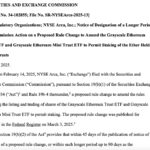In a significant move to regulate the burgeoning cryptocurrency industry, South Korean regulators have issued a request to Apple to block 14 mobile applications linked to foreign crypto operators that have failed to report their activities. This announcement, made on Monday, highlights the ongoing efforts by the Financial Intelligence Unit (FIU) to enhance oversight in a sector often associated with risks, including potential criminal activities.
Among the firms affected by this regulatory action are well-known crypto exchanges such as KuCoin and MEXC. Domestic access to their applications has been restricted since April 11, signaling the government’s commitment to ensuring that all crypto businesses operating within South Korea adhere to established laws. According to the FIU, foreign virtual asset operators wishing to conduct business in the country must report their activities to avoid facing criminal charges.
“Unreported business activities are subject to criminal punishment,” the FIU stated. “We are targeting overseas unreported virtual asset business operators conducting domestic activities without proper notifications.”
This year alone, the FIU has already identified six foreign companies engaged in such activities, following 16 similar cases reported in 2022. In its broader crackdown, South Korea has been increasingly blocking access to illegal crypto service providers. Just last month, regulators prompted Google to restrict 17 apps associated with unreported activities, underlining a clear pattern of action aimed at mitigating money laundering risks and protecting users from potential fraud.
As South Korea continues to shape its regulatory landscape for virtual assets, the FIU has pledged to maintain its vigilance, promising to collaborate with relevant organizations to prevent domestic access to apps and websites of non-compliant foreign operators. This determined approach reflects the government’s broader strategy to safeguard its financial system and enhance the security of its citizens in the rapidly evolving world of cryptocurrency.

South Korea’s Regulatory Actions Against Foreign Crypto Operators
Recent developments regarding South Korean regulations on cryptocurrency apps have significant implications for both investors and users in the region. Here are the key points to consider:
- Regulatory Requests:
- South Korean regulators have requested the blocking of 14 apps from Apple linked to foreign crypto operators.
- Among the targeted firms are crypto exchanges KuCoin and MEXC, with their apps blocked since April 11.
- Legal Compliance:
- Foreign virtual asset operators must report their activities to South Korea’s Financial Intelligence Unit (FIU).
- Failing to report can lead to criminal penalties.
- Focus on Enforcement:
- FIU has targeted unreported operators, identifying 16 companies in 2022 and 6 this year.
- The regulator has been proactive in blocking domestic access to apps and websites of these operators.
- Future Actions:
- The FIU plans to continue blocking access to non-compliant overseas operators to mitigate risks, including money laundering and user damage.
- Collaboration with relevant organizations will be ongoing to enhance enforcement measures.
These regulatory measures highlight the increasing scrutiny on crypto operations in South Korea, impacting how users interact with foreign crypto services and emphasizing the importance of compliance for global operators.
South Korea Tightens Grip on Foreign Crypto Apps: A Comparative Analysis
In a recent regulatory move, South Korean authorities have taken decisive action against foreign crypto app operators, particularly targeting companies like KuCoin and MEXC. This push to block access to unreported apps highlights a more stringent approach towards cryptocurrency regulation compared to other global markets. While some countries offer a relatively open environment for crypto operations, South Korea is reinforcing its barriers to protect its financial system and consumers. This creates a significant competitive advantage for compliant domestic exchanges that can emerge as trusted platforms amidst a landscape muddled with unregulated foreign entities.
However, this news presents both advantages and disadvantages. On one hand, it intensifies scrutiny on international crypto operators, compelling them to adhere to local regulations, thereby potentially enhancing user protection. The Financial Intelligence Unit’s (FIU) commitment to combating money laundering and illicit activities can foster greater confidence among users, who might feel safer using regulated apps. In contrast, this regulatory stance may drive foreign crypto businesses away, stymieing innovation and limiting user choices in South Korea.
Prospective affluent crypto investors and traders in South Korea may benefit from such stricter regulations; they gain a clearer pathway to safer investment practices without the overshadowing presence of unregulated apps. Conversely, the aggressive approach taken by the FIU can create significant challenges for smaller, international exchanges that may lack the resources to navigate the complex reporting requirements. As these firms scramble to comply or face bans, South Korean users may find themselves with reduced access to a diverse range of trading options.
This regulatory environment may lead to a clear bifurcation in the market, privileging larger, compliant exchanges while placing unnecessary burdens on newer players. As the FIU continues its campaign against unreported foreign exchanges, it fosters a competitive atmosphere that could discourage foreign innovation while reinforcing the dominance of local firms ready to adapt to stringent regulations. All in all, the situation paints a complex picture for cryptocurrency enthusiasts in South Korea, where opportunities and challenges coexist in the fast-evolving landscape of digital finance.

















